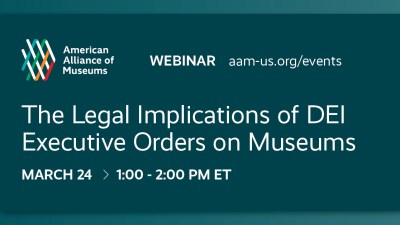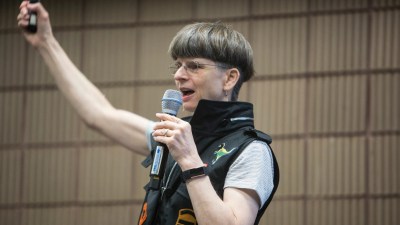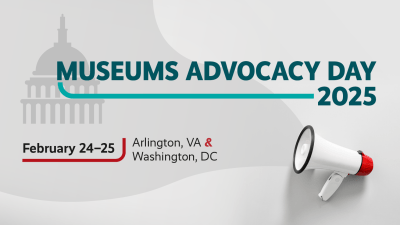I get a lot of calls from people asking for advice about careers: getting a first job, getting back into the museum field, switching to museums from another field.
I wish I could wave a wand and open a door for these earnest job seekers. I totally sympathize with their goal—personally, I think museum jobs are among the best in the world. My one regret about coming to work for AAM was losing the privilege of actually working in a museum, rather than with museums. I still miss “my” collections!
I want to do more than merely point out the obvious—that the economy stinks and there are very few job openings. (Not that this is news to the callers.) Some of the best and most experienced people I know in the field have “gone independent,” which often means piecing together shards of work as they become available. Some of the brightest and most talented young people I know have taken jobs outside the field, as they graduate with their hard earned museum studies degree and…nothing opens up.
However, since for every one person who does catch me on the phone or at a meeting, there may be probably ten or twenty or thirty others wishing they could ask the same question, here, for what it’s worth, is the advice I find myself cautiously offering. With the caveat that I don’t (ironically) have a crystal ball, these are just my best shots, based on watching the world and its behavior. How to get a job in the future museum, given the current lousy job market:
Skip over related stories to continue reading articleDo real work. Don’t wait to be hired for a paying job—identify a useful project and tackle it now. This doesn’t have to take the form of the classic (and increasingly resented) unpaid internship. Start a blog to share your thoughts, analysis and observations with the world. Fund your own project. Heck, start your own museum or museum-like endeavor.
Come at it from the side. Don’t train in museum work, train in something museums ought to know, but don’t (or should know better). Study games design. Or electrical engineering. Or futures studies. Get a good start in that field, and then convince a prospective museum employer that they can use that skill to expand their repertoire. Now instead of being one-among-a-hundred (or more) museum studies graduates you are a rare asset.
Focus on practice, not theory. If you are in a traditional museum studies program, don’t do your research or write your thesis on something academic or theoretical. For heaven’s sake don’t write the umpteenth paper on the history of accreditation (to have it molder on the shelf. Or on the hard drive. Whatever.) Find a museum that has a problem and offer to help solve it. Gather the data they need to make a decision. Prototype a process or a design that might work for them. Share whatever you learn from this project-share it: publish. Don’t wait for a peer-reviewed journal—publish on the internet on a blog or wiki or where ever else it will be known, accessible, useful.
Train for the future. Not for the past, or even the present. I talk to a lot of folks who seem to want jobs that were the norm twenty or thirty years ago. Some people want to be bookbinders or farriers too, and a few can find jobs, but it’s not as easy as finding work as a webmaster or a car mechanic. I think that for good or for ill, the old curatorial model of academic, scholarly expert will become rarer and rarer. Museums will need communicators, facilitators, moderators—who are in the best of all possible worlds also experts. Museums will be hiring curators of engagement and dialogue, curators of audience engagement and curators of the visitor experience. To make museums central to the next educational era, museum educators will need to know how to deliver compelling content over the web, make museum resources accessible and compelling for self-directed learners and create opportunities for exploration.
Perhaps the most useful thing I can do is open up this conversation to my colleagues: employed, unemployed, hiring, laying off staff or seeking jobs. What is your best advice to the earnest caller who says, “I want to work in a museum?” Use the comments section, below, to share your thoughts.









Yes, ALL work is difficult to find, for sure, but I think my best advice for those up-and-coming is that you have to be willing to move (even to small towns!) to get a museum job. This is especially true if you get a specialized degree. As someone who has been piecing things together with contract work with museums, I made a parallel move to archives just last month for some stability AND to work in the town I want to live in. Something had to give, and so I am investigating challenges with archives with great gusto, but keeping in contact with my museum peeps.
And I have to add: sometimes I think that most museums are still very much stuck in that academic model, and that my 1997 MA in museum studies will actually be 'meaningful' to those who hire sometime in the near future — but not just yet. It has been frustrating, but we all know our sector moves slowly. I am here for the long haul, though. 😀
I agree with Caroline. If you want to work in this field, you absolutely MUSt be willing to move. I work in the Federal museum system and getting in is the most difficult part. To land a Federal gig, you have to compete against others who are already in the system (who get preference). My advice for Federal jobs is to find ANY entry-level job and work at it for a year. After one year, an employer can direct hire someone who is already in the system without competition. Believe me, finding people in the Federal system who have museum studies degrees is almost impossible and we need them badly. If you have one and you have a year's worth experience in the system you should be successful. It doesn't matter if you bag groceries at the Commissary at your local military base for a year while you are in graduate school. We need you!
My advice continues to be: volunteer. Finding a museum job is still, for the most part, being in the right place at the right time. Already knowing the museum and the people generally gives you an advantage when soft money for short-term projects becomes available. And now, with the costs associated with a national — or even regional — search going up, museums are also looking within for their permanent positions.
But just volunteering at any museum is not a solution. You need to think carefully about what skills you have and what you want to learn. A good volunteer position should not only add to your skill set, but also help you figure out what you like and don't like in a museum setting. Do you need to interact with the public? Do you want a structured environment with policies and procedures in place? Or would you rather be part of the creative process in being one of the first professionals?
In looking for a permanent position I would also advise "think small" or at least smaller. While large museums may employ more people, there is also greater competition for those jobs. You don't necessarily need to move to a small town to work in a small museum. Being the newcomer in a small community may not be for you (see above).
Finally I agree with Carolyn that many museums are just catching up to the professionalism taught in Museum Studies, but even more with Beth that practical experience as part of your course work is crucial: find a museum that has a problem and offer to help solve it.
The stock market lost 10% of its value in the past two working days. Ouch. That will hurt your job search even more. I realize this delayed hiring process is terrible and it will stunt a young person’s career for at least a decade. But, here’s the good news. Anyone who wants a career in museums may have one. Keep working at it. Work is a four letter word, too. I love Beth’s advice about doing real work. Great.
Let me say: you won’t get a job by submitting 75 resumes on-line, as a smart, talented, highly trained young woman confirmed for me today. You need to get face-to-face, old-school, in front of people who can hire you or people who can lead you to people who can.
I am curious what a curator of engagement and dialogue does. We have been thinking about this a bit at my institution. What we are thinking of isn't just special projects or outreach – but something else all together. seeing our post has made me realize that other institutions are feeling this need as well.
Merry, here is a link to a post from Hanna Cho, the curator of audience engagement and dialogue at the Museum of Vancouver
http://www.museumofvancouver.ca/programs/blog/Hanna%20Cho
talking about one of her projects. By browsing the MOV blog you may find other snippets of news about her work.
Thanks "Center". I have been pulling up all kinds of information from the web and really like the center and your blog – so happy to have found them
"Don't train in museum work, train in something museums ought to know, but don't (or should know better)."
Do you think that graduate programs in museum studies are becoming obsolete? I have a Master's in museum education, which I think of as still a relatively new field to begin with.
Though I am a self described "museum buff", I came to this realization late in life. I was a Theater Arts major at San Jose State University and started my professional career as a production/stage manager for rock and roll concerts. Eventually, I changed occupations and began managing public assembly venues; convention center, theaters, arenas,etc. In 1997 America's Smithsonian tour came to the San Jose Convention Center for a 30 day exhibit and I was hooked! After years of consideration I decided I wanted to make the transition to museum management and operations. Though the SF Bay Area is home to dozens of museums, there weren't many jobs available to neophytes like me. I needed a new, fresh approach to this field; one that would allow me to bring a different perspective and skill set to the museum world.
I recently started a program in collaboration with History San Jose. We've partnered with Autodesk and FARO Technologies to train students and develop new techniques and procedures to digitally document the 14 acre property, 34 historic buildings and 500,000 artifacts in the museum's collections. This July, "The Reality Capture Technology Training Center at History Park will" conduct our first training program for students from 10th grade through graduate school. Students will learn to use cutting edge reality capture technology, photogrammetry and laser scanning, to create 3D models of buildings and artifacts for both cloud and database exhibits.
It is very important to look at all possibilities when you want to do something you truly enjoy. The odds of me finding the job I wanted and being able to provide for the family were looking pretty slim. I couldn't afford to wait for the right job to come along. I had to be willing to create my own "reality"
Check us out at http://www.virtualdesignanalysisgroup.blogspot.com... Or, look us up on Facebook at http://www.facebook.com/pages/Reality-Capture-Technology-Training-Center/304789553009310?fref=ts
That is very impressive and inspiring, Brian!
Lots of excellent ideas here, in both the main article and comments, but… Believe me, I would LOVE to be able to pick up and move across the country, or to “be[come] the newcomer in a small community,” however I have people that I can’t abandon (elderly/very young/health issues). People assume that I must not be serious about my career; this is not at all true. If I wasn’t committed to my work in the museum/public history/archives field I would long ago left for something that actually supports me. While the suggestions here are certainly constructive, they beg the question of, WHY are there so few jobs in our field? And shouldn’t we be trying as hard as possible to change that? Obviously the current pandemic situation has made things difficult in a wide variety of job markets. That being said though, professional opportunities in public history/cultural heritage were few and far between long before covid-19. It’s definitely not for lack of important work to do. The problem is sustainable revenue sources, and for that we need to press for increased public funding. Covid has brought many things into focus in the museum world, among them the fact that private donations, ticket sales,and gift shops alone may not be enough to sustain us.